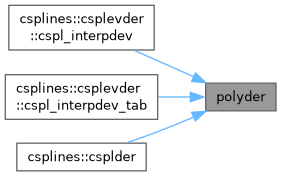polynomials provides a framework for simple (and quite naive) work with polynomials Further description in Submodule interpolate More...
Data Types | |
| interface | polyval |
| Computes the value of the polynomial when applied to a number or list of numbers. More... | |
Functions/Subroutines | |
| real(dp) function, dimension(:), allocatable, public | polyder (p, m) |
| polyder Computes the derivative of a polynomial. Returns an array with the coefficients | |
| real(dp) function, dimension(:), allocatable, public | polyint (p, m, k) |
| polyint Computes m-esima antiderivative | |
| subroutine, public | bisect_pol (x0, dx, p, toler, x) |
| bisect_pol Classical bisection method for root finding on polynomials | |
Detailed Description
polynomials provides a framework for simple (and quite naive) work with polynomials Further description in Submodule interpolate
It allows to easily evaluate, derivate, and integrate a polynomial
Examples:
Function/Subroutine Documentation
◆ bisect_pol()
| subroutine, public bisect_pol | ( | real(dp), intent(in) | x0, |
| real(dp), intent(inout) | dx, | ||
| real(dp), dimension(:), intent(in) | p, | ||
| real(dp), intent(in) | toler, | ||
| real(dp), intent(out) | x ) |
bisect_pol Classical bisection method for root finding on polynomials
- Parameters
-
[in] x0 Initial value [in,out] dx range. It will probe in the range (x0-dx, x0+dx). On return it will have an estimation of error [in] p Array with coefficients of polynomial [in] toler Tolerance in the root determination [out] x Value of the root
◆ polyder()
| real(dp) function, dimension(:), allocatable, public polyder | ( | real(dp), dimension(:), intent(in) | p, |
| integer, intent(in), optional | m ) |
polyder Computes the derivative of a polynomial. Returns an array with the coefficients
- Parameters
-
[in] p Array of coefficients, from highest degree to constant term [in] m Order of derivation
- Returns
- Derivative of polynomial
Examples:
References basic::print_msg(), and basic::zero.
Referenced by csplevder::cspl_interpdev(), csplevder::cspl_interpdev_tab(), and csplines::csplder().


◆ polyint()
| real(dp) function, dimension(:), allocatable, public polyint | ( | real(dp), dimension(:), intent(in) | p, |
| integer, intent(in), optional | m, | ||
| real(dp), intent(in), optional | k ) |
polyint Computes m-esima antiderivative
- Parameters
-
[in] p Array of coefficients, from highest degree to constant term [in] m Number of times that p must be integrated [in] k Additive Constant
- Returns
- Antiderivative polynomial
Examples:
References basic::print_msg(), and basic::zero.
Referenced by csplines::csplantider().

